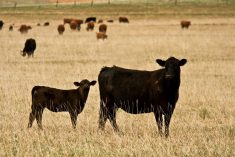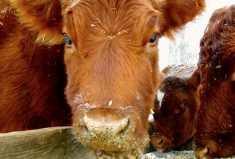Compared to last week, western Canadian yearling prices were under pressure trading steady to $3 lower; however, eastern Canadian orders were prevalent in Manitoba and eastern Saskatchewan, where values were relatively unchanged from week-ago levels. Alberta feedlot demand was subdued as the deferred live cattle futures traded to three-month lows. Most operations are holding high-priced calves from last fall and the margin structure looks quite disastrous for the summer timeframe. Prices on backgrounded cattle were quite variable with the discerning eye heavily discounting levels of fleshiness.
In east-central Alberta, a larger group of Simmental-cross steers averaging just over 900 lbs. traded hands at $165 while larger-frame medium-flesh tan heifers weighing 915 lbs. dropped the gavel at $159. Fleshier medium-frame red white-face steers averaging 910 lbs. were quoted at $162 in southern Saskatchewan. There were sales where only a few buyers showed up and the market experienced $10 range on similar-weight cattle with various quality features.
Read Also

U.S. grains: Soy futures post biggest monthly gain in nearly five years on China trade optimism
U.S. soybean futures climbed to a 15-month high and posted their biggest monthly gain in nearly five years on Friday following a rally fueled by the prospect of revived exports to China.
The market for grassers was quite vigorous compared to yearlings. Buyers sitting on their hands suddenly came to life when cattle fit for grass surfaced. Only small packages were available on lighter calves and the market incorporated a risk premium given the scarcity effect. In central Alberta, Charolais-cross steers averaging 505 lbs. reached a lofty level of $252; in southern Manitoba, mixed steers averaging around 525 lbs. were quoted at $535.
The fed cattle market has been relatively flat over the past couple of months, trading from $163 to $166. While current margins are in positive territory, feedlots are in a conundrum as the futures market divorces from the cash trade. Barley and feed grain prices continue to percolate higher, which is also setting a negative tone for the heavier replacements.
— Jerry Klassen manages the Canadian office of Swiss-based grain trader GAP SA Grains and Produits Ltd. and is president and founder of Resilient Capital, specializing in proprietary commodity futures trading and market analysis. Jerry consults with feedlots on risk management and writes a weekly cattle market commentary. He can be reached at 204-504-8339.













